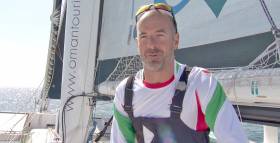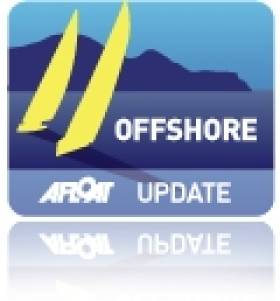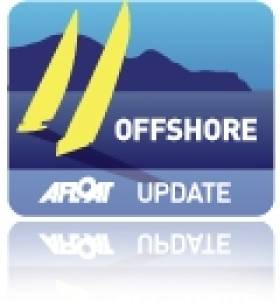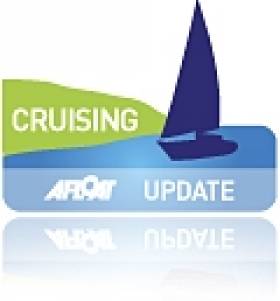Displaying items by tag: Oman
Ireland’s Robert Dickson and Seán Waddilove ended in eighth overall at the Olympic 49er World Championships in Mussanah, Oman today (Sunday 21 November).
The Paris 2024 campaigners, who also competed at Tokyo 2020 earlier this year, were unable to repeat some of their earlier form from the series on the final day, placing 12th in the last Gold fleet race before ending the medal race in eighth to secure the same overall standing.
Bart Lambriex with Floris van de Werken of the Netherlands are the new 49er World Champions, having dominated the series to win even after disqualification from the final fleet race. Watch the final day’s racing below:
Dickson and Waddilove — who sail out of Howth Yacht Club and Skerries Sailing Club respectively — secured seven top-three results, including two race wins during the 16-race championship,
But the Dublin skiff pair’s overall score was hindered by some mid-fleet results in the tricky, light-wind conditions experienced at the venue.
In the medal race final, their boat-speed was hampered when the mainsail hoist loosened, forcing them to re-hoist which effectively ended their hopes of a podium result.
Meanwhile, a 15th place in the final race of the series for the new Royal Cork pairing of Séafra Guilfoyle and Johnny Durcan landed them in 20th overall, marking a strong debut performance with some notable individual race results.
Dickson & Waddilove Back in Contention Heading Into Final Day of 49er Worlds in Oman
Two third places for Paris 2024 campaigners Robert Dickson and Seán Waddilove at the Olympic 49er World Championships in Mussanah, Oman today (Saturday 20 November) have boosted their chances ahead of tomorrow’s final.
After a challenging day on Friday when the Dublin skiff pair — who sail out of Howth Yacht Club and Skerries Sailing Club respectively — slipped to 11th overall, they opened Saturday’s round with a 16th place before coming back strongly with two third places.
Dickson and Waddilove now stand fifth overall and within reach of a podium finish, with Sunday morning’s single race to decide the top 10 boats for the high-scoring medal race final.
Few of the leading boats escaped the conditions entirely with big scores across the fleet leading to a close championship series.
Meanwhile, the new Royal Cork pairing of Séafra Guilfoyle with Johnny Durcan counted a 10th place as their best result for the day. The Crosshaven crew slipped back a little in the standings to 21st but still count achieving Gold fleet as their successful debut regatta together.
Sunday’s schedule will feature a final fleet race to end the main series, with the top 10 boats going into a single final race that counts for double points to determine the championship and podium places.
Ups & Downs for Irish Crews in Gold Fleet at 49er Worlds in Oman
The opening three races of the Gold fleet series proved exceptionally challenging for the Irish crews at the Olympic 49er World Championship in Mussanah, Oman today (Friday 19 November).
Although the late start to the series saw slightly more breeze than previous days, racing continued until just after sunset, adding an extra factor for the 25-strong fleet.
Paris 2024 campaigners Robert Dickson and Seán Waddilove (Howth Yacht Club and Skerries Sailing Club respectively) dropped from fourth overall going into the series and out of the top 10 after an uncharacteristically poor day for the pair.
A 17th in the opening race initially dropped the pair to ninth place. However, they won the start of the second race and placed third which allowed them to recover to eighth place.
However, the final race saw them end in 22nd place to leave them 11th overall with two days remaining in the series.
Meanwhile, the new Royal Cork pairing of Séafra Guilfoyle with Johnny Durcan were the better of the two Irish boats for the day, counting a fourth place behind Dickson and Waddilove and their first day of Gold fleet racing has already seen an improvement to their standing in the event.
Their score moves them up to 19th overall on their first foray together at a senior world championship regatta.
Three races are scheduled for tomorrow, followed by two races on Sunday to decide the top 10 boats overall for the medal race.
Three high speed MOD70s are closing in on the Volvo Round Ireland Race finish line at Wicklow, for what might yet be a record breaking time, early tomorrow morning. In an exclusive pre–start video (below) for Afloat.ie, Digby Fox interviewed County Kerry sailor Damian Foxall onboard Round Ireland record holder Musandam Oman, currently off Rathlin Island.
In this video, Foxall, a Volvo Ocean Race winner, who has sailed eight round the world races, reveals he has never sailed Round Ireland! And Foxall's crew–mates, including skipper Sidney Gavignet, give an insight into sailing the fastest boats in the world and the importance of their 2015 record.
See Round Ireland tracker here and keep to up to date with the fleet's progress with Afloat's regular Round Ireland 2016 updates here
It May Be A New Round Ireland Record But The Three Hour Margin Tells Us What A Great Job Lakota Did 22 Years Ago
#roundirelandrecord – At his fourth attempt, top French skipper Sidney Gavignet with the Mod 70 trimaran Musandam-Oman Sail has finally toppled the long-standing Round Ireland record set in September 1993 by American Steve Fossett with the 60ft trimaran Lakota, but by only three hours.
And if anything, the Gavignet achievement has heightened just what a remarkable job was done 22 years ago when the American skipper with his smaller, heavier and much less technically advanced boat set such an exceptional time writes W M Nixon.
Unlike the state-sponsored Musandam-Oman campaign (and it's one very rich state), the Lakota project was very much a private enterprise effort, with Fossett's crew including husband-and-wife multi-hull enthusiasts Con Murphy and Cathy MacAleavey of the National YC in Dun Laoghaire. They had met the Lakota crew in Portugal some months earlier, and had persuaded them that a successful round Ireland challenge was just what was needed to set Fossett's sailing on the track to high achievement, and their suggestion succeeded brilliantly on both counts.
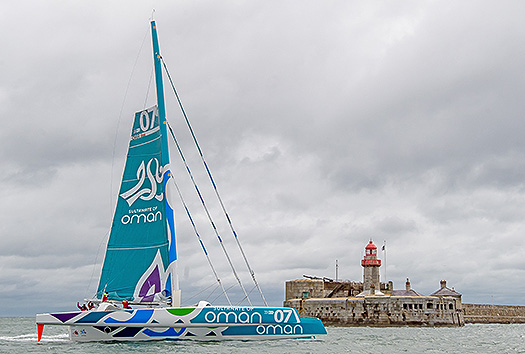
The new record holders – The mighty Mod70 returns to Dun Laoghaire this morning
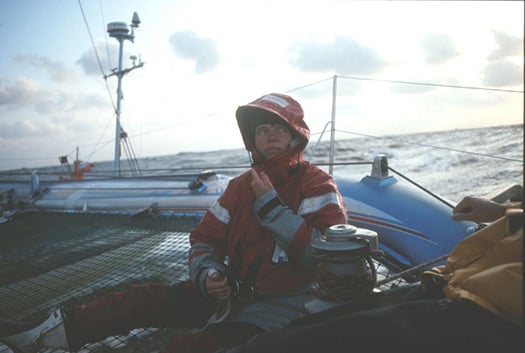
Cathy MacAleavey in some of the gentler conditions during Lakota's successful challenge
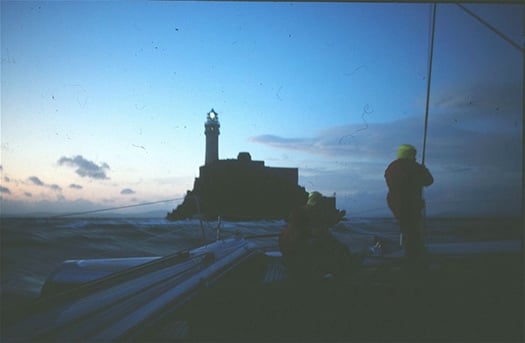
Getting there – when Lakota went past the Fastnet during her 1993 anti-clockwise circuit, they knew they were well on their way with the chance of an outstanding record.
Lakota's startling new time of 44 hours was not easily achieved, as the boat had arrived in Dun Laoghaire with a damaged mainsail which had to be rushed to Crosshaven for repairs by McWilliam Sailmakers while the clock was remorselessly ticking down towards the ideal situation of a vigorous low pressure area becoming centred over Ireland.
But as it happened, the Gods were on their side. The delay while waiting for the sail repair made the weather situation even better as far as records were concerned, and Lakota went round in style as regards speed, though for quite a lot of the passage she was sailing in conditions in which most people would have been very content to stay comfortably at home in front of a large fire.
And as the Lakota challenge included Irish crew and was Irish inspired, we all felt that we had a part of it, however small. But for this new record, the only Irish element has been the weather and our coastline, for although Gavignet's interest was first inspired some years ago by our own Damian Foxall who was involved in two of Gavignet's previous attempts on the Ireland challenge, the Kerryman is of course currently active in the Volvo World Race, and has had the frustration of watching from afar as Gavignet finally does the business.
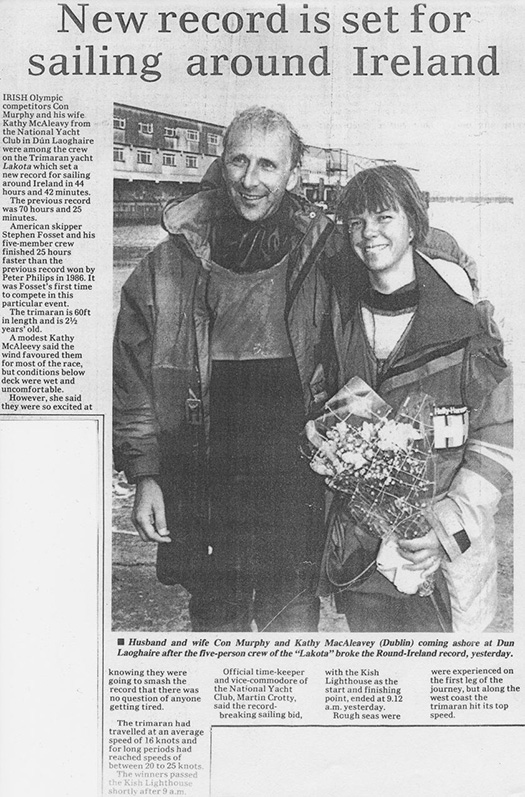
Tired but triumphant – Con and Cathy as pictured in the Evening Herald at the conclusion of Lakota's successful challenge
As it happens, although the monitoring of the challenge has been under Record Commissioner Chris Moore of the National Yacht Club, the crew is distinctly international, with two French – Gavignet himself and veteran Jean Baptiste Leavailliant, plus one Spanish, Alex Pella, and three Omanis who are now Gavignet veterans - Fahad Al Hasni, Yasser Al Rahbi, and Sami Al Shukaili.
The weather pattern was settling in nicely with strong sou'easters when they went off at 1800 hrs on Monday to storm northeastwards from the start point at the Kish L/H through the Irish Sea. But the current spell of volatile weather was making things decidedly moody over the north of Ireland. What had been a useful low pressure area of around 780 had already developed further to have two centres, and it may well have become the case that at least three different vortices were in action to provide unstable wind patterns of rapidly varying strengths, and sometimes no strength at all.
For the first stage, they'd been averaging speeds of up to 25 knots and better, and had confidently been anticipating knocking a cool ten hours off the record. That would have brought it in within the 35 hour working week so beloved of the French. But the fickle North Channel winds had other plans, and they unexpectedly dropped to just 6.32 knots SOG off Cushendall in County Antrim for a frustrating period around midnight on Monday.
Then they got going again along the North Coast, and were well back on track for a new record which, after all, required an average speed of only 16 knots. But one of the low pressure centres off the Donegal coast got itself all over the place through Tuesday afternoon, and progress was at times excruciatingly slow – at one stage northwest of Erris Head in far Mayo, they were crawling along at 3.11 knots, which for a MOD 70 is dead stopped.
The frustration was enormous, for they knew there were strong west to northwest winds on the way, and trying to get to them was the challenge. By Tuesday evening they were at last beginning to benefit, and then Musandam-Oman Sail fairly streaked south in very impressive style, zooming past the Blaskets and shaping her course with an ever-increasing eastern slant past the Skelligs and the Fastnet and along the south coast. She was tacking to lee at speeds which were hauling them rapidly back into the record business, but there was now no way they could make that elusive ten-hours-off-it target.
A least two high profile capsizes with MOD 70s – including on in Dublin Bay a couple of years ago – have shown that while they're able and versatile boats, they have their limits. So in tearing northwards along the east coast this morning in relatively smooth water with the wind off the land, care had to be taken that any sudden squalls off the mountains wouldn't take charge. But everything was kept firmly under control and the job was finished in businesslike style just before 11 o'clock this morning. And they're well pleased with their achievement, as it's a much clearer margin than the 16 minutes with which they bested Bank Populaire's Round Britain and Ireland record last year. So well done, Musandam-Oman Sail. And here's to the good old Lakota – she still sails the sea, a very special boat.
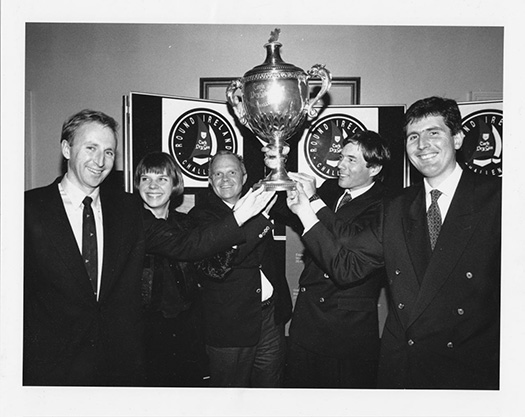
Victory! Lakota's crew with the trophy in 1993 are (left to right) Con Murphy, Cathy MacAleavey, the late Steve Fossett, Steve Scully, and Brian Thompson
#roundirelandspeedrecord – Musandam-Oman Sail - flagship of the Sultanate of Oman - completed the Round Ireland speed sailing record attempt this morning just before 1100 taking three hours off the 22–year–old record, breaking Steve Fossett's long standing record of 44 hours with Lakota in 1993.
The 70–foot Multihull screamed past the Muglins Rocks on the outskirts of Dublin bay at over 30–knots to claim the record in a time of 40 hours, 51 minutes and 57 seconds.
The record officiated by Irish speed sailing commissioner Chris Moore from onboard a DBSC committee vessel has yet to be ratified by the World Speed Sailing Record Council.
On coming ashore at the National Yacht Club the first call by French Skipper Sidney Gavignet was for a doctor to treat a crewmans shoulder due to an injury sustained on the 700–mle journey that started at 6pm on Bank Holiday Monday.
Onboard with Gavignet are Alex Pella from Spain and Jean Baptiste Levaillant together with three Omani sailors and skipper Gavignet. Sadly for this attempt, Ireland's offshore supremo Damian Foxall was not on the crew list.
Strong winds this morning on the Wicklow coast presented ideal conditions for the closing stages of the record attempt for the professional crew who travelled the last 100–km in little over two hours. The scenario was much different to 12 hours earlier when the 70–footer was more–or–less beclamed off the Mayo coast.
The tired and successful crew came ashore at lunch–time and ordered steak and chips at the National Yacht Club to celebrate the fastest ever sailing circumnavigation of Ireland.
"This is a great accomplishment for Oman and Oman Sail," said David Graham, CEO of Oman Sail. "Attempting to break the Round Ireland record has been our goal for many years now and achieving the feat is a shining example of the hard work and dedication of our sailing squad. Racing against yourself to set a time is the hardest test of discipline. The team must remain focused and motivated at all times, and we have instilled these values since the start of the Oman Sail programme. With a 50% Omani crew, this record shows that the present and the future of sailing in Oman is on the right course."
The crew needed to be back by 1500 to take the record but their breakneck speeds down the west coast of Ireland, at one stage reaching 38 knots, meant they were finished well before that, some three hours and 50 minutes faster than the 44 hours and 42 minutes set by Steve Fossett in his first ever world record back in September 1993 aboard his 60ft trimaran Lakota.
Helmsman Fahad Al Hasni said this record attempt coming at the end of a European winter, had proved tough.
"It was both scary and exciting because we saw 40 knots of wind and massive waves that we reckoned were around six metres but the main challenge was the cold," said Al Hasni.
"It is still winter here and my hands were so cold I still can't feel them but I'm really happy because there have been some very famous sailors who have made attempts on this record but we are the ones who now hold it. We have become a really good, tough team and it feels great to be part of it."
It had been a challenging but amazing experience for the Omani sailors, added Gavignet, who was full of praise for his crew.
"This was a real test for them and they came through with flying colours – the whole crew put in a great effort.
"We had to be very careful in these conditions and had no choice but to slow down at times but to have achieved the record so early in our season is a great feeling. It had been a priority and now it is done."
This was Musandam-Oman Sail's second attempt on the Round Ireland record. Two years ago they set off from Dublin Bay with high hopes but were forced to abandon due to unsafe conditions.
Today was a different story and everyone on board was delighted to add this one to their burgeoning collection.
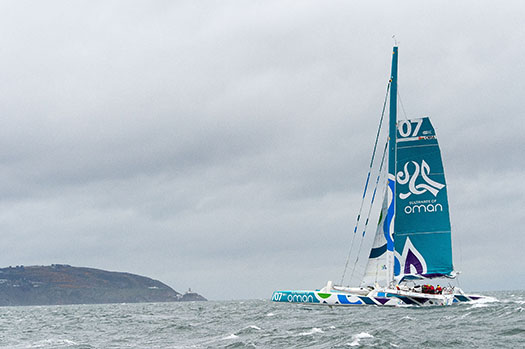
Mission accomplished! The giant Tri completes its 700–mile voyage in record time this morning. Photo: Michael Chester
Read also articles by WM Nixon:
Round Ireland Speed Sailing Record Times and It May Be A New Round Ireland Record But The Three Hour Margin Tells Us What A Great Job Lakota Did 22 Years Ago
Cruising Association Shocked by Fatal Shootings
Scott Adam was a member of the Cruising Association and was taking part in the round-the-world Blue Water Rally.
The Cruising Association is Britain's leading organisation for cruising sailors with members worldwide and works closely with government and other agencies to represent the interests of cruising yachtsmen including combating the menace of piracy.
"Our thoughts are with the family and friends of those who died", the statement ended.



























